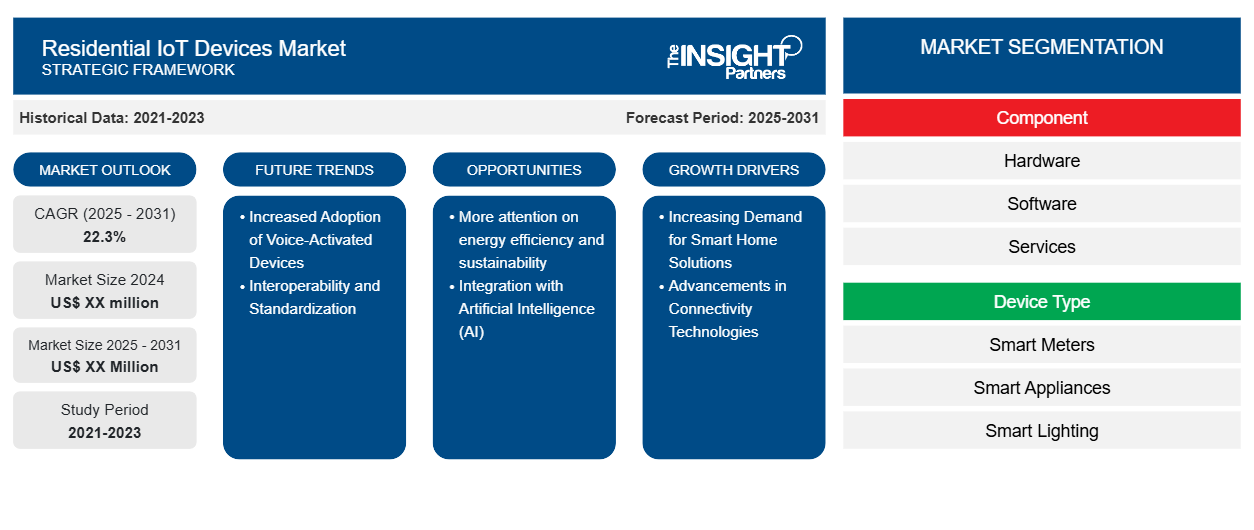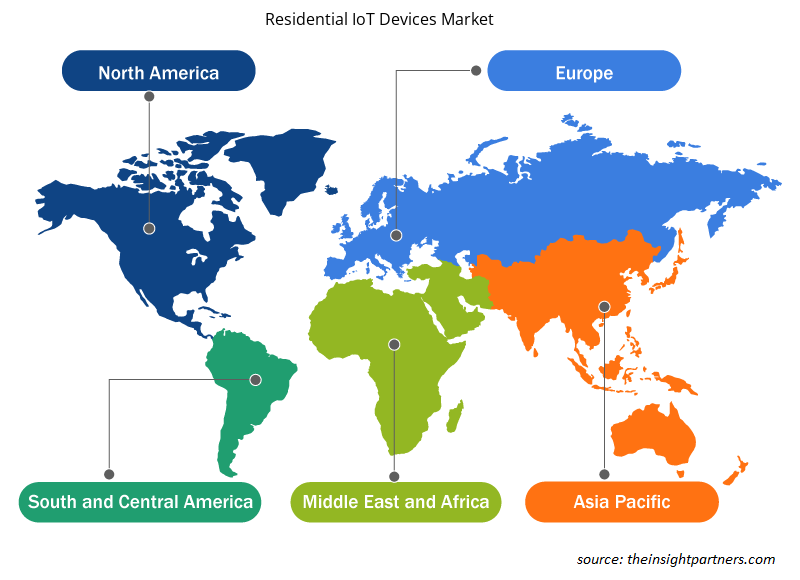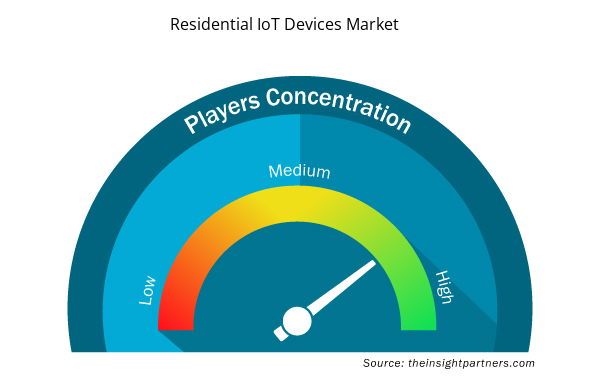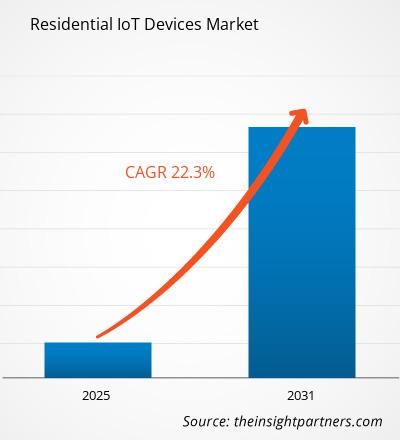The Residential IoT Devices Market is expected to register a CAGR of 22.3% from 2025 to 2031, with a market size expanding from US$ XX million in 2024 to US$ XX Million by 2031.
The report is segmented by Component [Hardware, Software, Services(Professional Services,Managed Services)]; Device Type (Smart Meters, Smart Appliances, Smart Lighting, Smart Home Gateways, Smart Thermostats, Others); Geography (North America, Europe, Asia-Pacific, Middle East & Africa, South and Central America).
The global analysis is further broken-down at regional level and major countries. The report offers the value in USD for the above analysis and segments
Purpose of the Report
The report Residential IoT Devices Market by The Insight Partners aims to describe the present landscape and future growth, top driving factors, challenges, and opportunities. This will provide insights to various business stakeholders, such as:
- Technology Providers/Manufacturers: To understand the evolving market dynamics and know the potential growth opportunities, enabling them to make informed strategic decisions.
- Investors: To conduct a comprehensive trend analysis regarding the market growth rate, market financial projections, and opportunities that exist across the value chain.
- Regulatory bodies: To regulate policies and police activities in the market with the aim of minimizing abuse, preserving investor trust and confidence, and upholding the integrity and stability of the market.
Residential IoT Devices Market Segmentation
Component
- Hardware
- Software
- Services
Device Type
- Smart Meters
- Smart Appliances
- Smart Lighting
- Smart Home Gateways
- Smart Thermostats
- Others
Customize This Report To Suit Your Requirement
You will get customization on any report - free of charge - including parts of this report, or country-level analysis, Excel Data pack, as well as avail great offers and discounts for start-ups & universities
Residential IoT Devices Market: Strategic Insights

- Get Top Key Market Trends of this report.This FREE sample will include data analysis, ranging from market trends to estimates and forecasts.
Residential IoT Devices Market Growth Drivers
- Increasing Demand for Smart Home Solutions: Growing consumer interest in smart home technologies is one of the major driving forces behind the residential IoT devices market. Convenience, security, and energy efficiency at home have been fueling consumer demand for smart home solutions. Smart thermostats, lighting systems, and security cameras are fast becoming integrated components of modern homes. This is fueled by the demand for better home environment management and the capability to remotely control devices via smartphones and voice assistants, which has positively influenced the rising uptake of IoT in residential applications.
- Advancements in Connectivity Technologies: The advancements in connectivity technologies such as Wi-Fi 6, Zigbee, and Z-Wave are equipping residential IoT devices. All these technologies enable equipment to work in a harmonious manner, ensuring greater functionality and usability on behalf of users. Better connectivity integrates more than one device into the smart home environment, and thus makes better management of the house for consumers. Reliability and ubiquity come with an expectation of increased penetration by IoT devices.
Residential IoT Devices Market Future Trends
- Increased Adoption of Voice-Activated Devices: It is increasingly adopted, because of the growing trend on virtual assistants like Amazon Alexa, Google Assistant, and Apple Siri. Devices like these offer an added advantage of convenience and usability because they allow the user to manipulate their smart home systems through voice commands. The increased demand of voice-activated IoT devices is also due to rapid development in speech recognition technology; soon, this will increase as people become accustomed to voice commands every day.
- Interoperability and Standardization: As the number of IoT devices in residential settings grows, interoperability between different devices and platforms is becoming a key trend. Consumers want devices from different manufacturers to work together seamlessly, enabling a cohesive smart home experience. Companies are focusing on developing IoT devices that adhere to common standards and protocols, such as Zigbee, Z-Wave, and Matter (formerly Project Connected Home over IP). The standardization of IoT systems enables devices from various manufacturers to communicate with one another, enhancing user experience and driving further adoption of IoT technologies in homes.
Residential IoT Devices Market Opportunities
- More attention on energy efficiency and sustainability: With soaring costs of energy and growing environmental issues, the need for energy efficiency and sustainability in residential areas is the highest it has ever been. IoT devices such as smart meters and energy management systems enable customers to track and then optimize their energy consumption. The devices offer real-time data and insights to the user so that they can make better decisions in reference to current energy consumption levels, thereby saving them money while reducing carbon footprint. This technology has therefore sparked a demand for home IoT solutions that support sustainable living.
- Integration with Artificial Intelligence (AI): Huge scope for innovation and functional enhancement exists with AI in residential IoT devices. Through AI, devices can learn preferences of the user, automate routines, and provide personalized recommendations for enhanced user experience. In a scenario where smart and intuitive home solutions are in demand by consumers, companies can separate themselves from competition with AI-based IoT offerings.
Residential IoT Devices Market Regional Insights
The regional trends and factors influencing the Residential IoT Devices Market throughout the forecast period have been thoroughly explained by the analysts at Insight Partners. This section also discusses Residential IoT Devices Market segments and geography across North America, Europe, Asia Pacific, Middle East and Africa, and South and Central America.

- Get the Regional Specific Data for Residential IoT Devices Market
Residential IoT Devices Market Report Scope
| Report Attribute | Details |
|---|---|
| Market size in 2024 | US$ XX million |
| Market Size by 2031 | US$ XX Million |
| Global CAGR (2025 - 2031) | 22.3% |
| Historical Data | 2021-2023 |
| Forecast period | 2025-2031 |
| Segments Covered |
By Component
|
| Regions and Countries Covered | North America
|
| Market leaders and key company profiles |
Residential IoT Devices Market Players Density: Understanding Its Impact on Business Dynamics
The Residential IoT Devices Market market is growing rapidly, driven by increasing end-user demand due to factors such as evolving consumer preferences, technological advancements, and greater awareness of the product's benefits. As demand rises, businesses are expanding their offerings, innovating to meet consumer needs, and capitalizing on emerging trends, which further fuels market growth.
Market players density refers to the distribution of firms or companies operating within a particular market or industry. It indicates how many competitors (market players) are present in a given market space relative to its size or total market value.
Major Companies operating in the Residential IoT Devices Market are:
- Amazon.com, Inc.
- Bosch.IO GmbH (Robert Bosch GmbH)
- ecobee
- Google, LLC
- Honeywell International Inc.
Disclaimer: The companies listed above are not ranked in any particular order.

- Get the Residential IoT Devices Market top key players overview
Key Selling Points
- Comprehensive Coverage: The report comprehensively covers the analysis of products, services, types, and end users of the Residential IoT Devices Market, providing a holistic landscape.
- Expert Analysis: The report is compiled based on the in-depth understanding of industry experts and analysts.
- Up-to-date Information: The report assures business relevance due to its coverage of recent information and data trends.
- Customization Options: This report can be customized to cater to specific client requirements and suit the business strategies aptly.
The research report on the Residential IoT Devices Market can, therefore, help spearhead the trail of decoding and understanding the industry scenario and growth prospects. Although there can be a few valid concerns, the overall benefits of this report tend to outweigh the disadvantages.
- Historical Analysis (2 Years), Base Year, Forecast (7 Years) with CAGR
- PEST and SWOT Analysis
- Market Size Value / Volume - Global, Regional, Country
- Industry and Competitive Landscape
- Excel Dataset



Report Coverage
Revenue forecast, Company Analysis, Industry landscape, Growth factors, and Trends

Segment Covered
This text is related
to segments covered.

Regional Scope
North America, Europe, Asia Pacific, Middle East & Africa, South & Central America

Country Scope
This text is related
to country scope.
Frequently Asked Questions
Some of the customization options available based on the request are an additional 3-5 company profiles and country-specific analysis of 3-5 countries of your choice. Customizations are to be requested/discussed before making final order confirmation# as our team would review the same and check the feasibility
The report can be delivered in PDF/PPT format; we can also share excel dataset based on the request
Increased Adoption of Voice-Activated Devices is anticipated to play a significant role in the global Residential IoT Devices Market in the coming years
Increasing Demand for Smart Home Solutions and Advancements in Connectivity Technologies are the major factors driving the Residential IoT Devices Market
The Residential IoT Devices Market is estimated to witness a CAGR of 22.3% from 2023 to 2031
Trends and growth analysis reports related to Electronics and Semiconductor : READ MORE..
1.Amazon.com, Inc.
2.Bosch.IO GmbH (Robert Bosch GmbH)
3.ecobee
4.Google, LLC
5.Honeywell International Inc.
6.LG Electronics
7.Qualcomm Technologies, Inc.
8.Radio Thermostat Company of America
9.Samsung
10.Signify Holding

 Get Free Sample For
Get Free Sample For